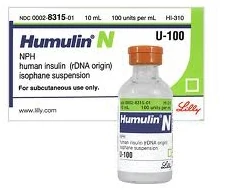No edit summary |
No edit summary |
||
| Line 5: | Line 5: | ||
The basis of [[absorption]] of any insulins containing protamine<ref>{{cite web|url=http://web.archive.org/web/20060613202518/http://diabetic-help.com/kANIMINS2.txt|title=Textbook of Endocrinology, 4th edition|year=1968|author=Williams, Robert|publisher= W. B. Saunders}}</ref> is the breakdown of this protein by proteolytic enzymes<ref>{{cite web|url=http://en.wikipedia.org/wiki/Proteolytic_enzyme |publisher=Wikipedia|title=Proteolytic Enzymes}}</ref> or proteases in the body. Only after this is accomplished can the insulin itself be absorbed. More protamine in the [[suspension]] means insulin absorption will be delayed longer; less protamine means the insulin will act faster. |
The basis of [[absorption]] of any insulins containing protamine<ref>{{cite web|url=http://web.archive.org/web/20060613202518/http://diabetic-help.com/kANIMINS2.txt|title=Textbook of Endocrinology, 4th edition|year=1968|author=Williams, Robert|publisher= W. B. Saunders}}</ref> is the breakdown of this protein by proteolytic enzymes<ref>{{cite web|url=http://en.wikipedia.org/wiki/Proteolytic_enzyme |publisher=Wikipedia|title=Proteolytic Enzymes}}</ref> or proteases in the body. Only after this is accomplished can the insulin itself be absorbed. More protamine in the [[suspension]] means insulin absorption will be delayed longer; less protamine means the insulin will act faster. |
||
| − | Protamine, like insulin itself, is a protein. In the case of [[Regulation difficulties|antibody]] formation, it is possible that the insulin itself is not the cause of them; the proteins present in the [[suspension]], such as protamine, may be<ref>{{cite web|url=http://web.archive.org/web/20071117211132/http://www.vetsulin.com/Veterinarian/ProblemRegulation.html#Antibodies |title=Problems With Regulation of Diabetes Mellitus-Antibodies |
+ | Protamine, like insulin itself, is a protein. In the case of [[Regulation difficulties|antibody]] formation, it is possible that the insulin itself is not the cause of them; the proteins present in the [[suspension]], such as protamine, may be<ref>{{cite web|url=http://web.archive.org/web/20071117211132/http://www.vetsulin.com/Veterinarian/ProblemRegulation.html#Antibodies |title=Problems With Regulation of Diabetes Mellitus-Antibodies|publisher=Intervet}}</ref>. In this case, changing the type of [[suspension]] would solve the problem. |
Protamine has other medical uses as well. |
Protamine has other medical uses as well. |
||
Revision as of 21:16, 27 September 2010

Humulin N, an isophane insulin suspended with protamine.
Protamines are proteins derived from the sperm or testes of salmon or related fish. They are added[1] are added to insulins NPH Neutral Protamine Hagedorn and PZI protamine zinc to delay their absorption.
The difference between isophane/NPH insulins and PZI insulins is the amount of protamine used; there is more in PZI than in NPH/isophane insulins. It's the extra protamine which makes the PZI a slow-acting insulin.
The basis of absorption of any insulins containing protamine[2] is the breakdown of this protein by proteolytic enzymes[3] or proteases in the body. Only after this is accomplished can the insulin itself be absorbed. More protamine in the suspension means insulin absorption will be delayed longer; less protamine means the insulin will act faster.
Protamine, like insulin itself, is a protein. In the case of antibody formation, it is possible that the insulin itself is not the cause of them; the proteins present in the suspension, such as protamine, may be[4]. In this case, changing the type of suspension would solve the problem.
Protamine has other medical uses as well.
See also suspension. ![]()
References
- ↑ The Diagnosis and Management of Anaphylaxis - Protamine. Journal Allergy & Clinical Immunology (1998).
- ↑ Williams, Robert (1968). Textbook of Endocrinology, 4th edition. W. B. Saunders.
- ↑ Proteolytic Enzymes. Wikipedia.
- ↑ Problems With Regulation of Diabetes Mellitus-Antibodies. Intervet.